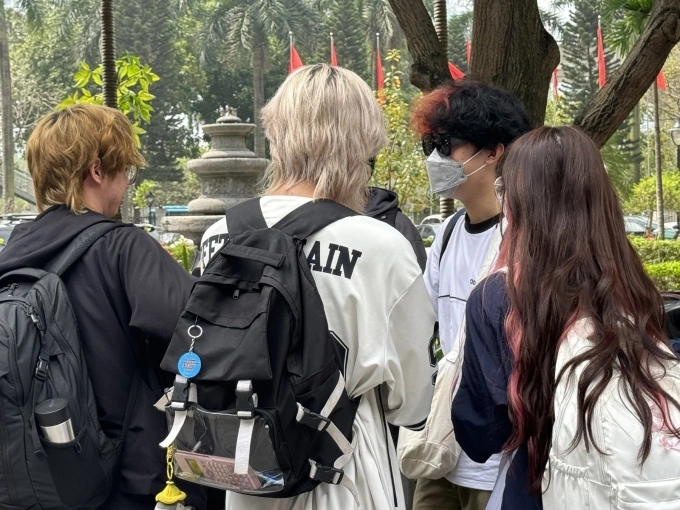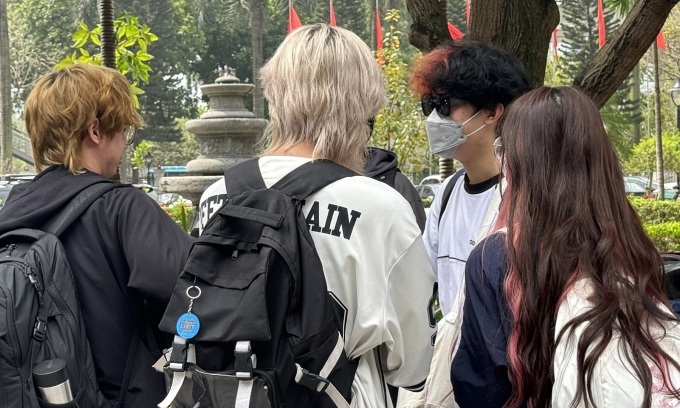“At the moment, the considered altering my style model simply to safe a job by no means crossed my thoughts,” Cuong, 23, from Hanoi mentioned.
Cuong, a hip-hop fanatic, embraces a grungy aesthetic, together with dyed blonde hair, nostril rings, earrings, and arm tattoos. “Ripped denims are a staple for me, although they typically draw criticism for making me appear to be a delinquent,” he shared.
Regardless of others often disapproving of his style decisions, Cuong remained unfazed till his distinctive model started to hinder his job search.
Final 12 months, Cuong interviewed for a tech firm function, going through a feminine division head in her 40s.
“Proper from the second she noticed me, her demeanor turned unwelcoming, regardless of me sporting a polo shirt and foregoing my regular ripped denims,” Cuong remembered.
Because the interview progressed with a number of questions and assessments, the interviewer warmed as much as Cuong after observing his robust efficiency. Nonetheless, she stipulated that she would solely lengthen a suggestion if Cuong toned down his hair colour and eliminated his piercings. After considering for 2 days, Cuong finally selected to say no the provide.
 |
|
College college students in Hanoi interact in dialog on campus, March 23, 2024. Picture by VnExpress/ Pham Nga |
Psychologist Hong Huong from the Youngsters’s Rights Safety Affiliation famous that whereas society is changing into extra accepting of younger folks’s style and life-style decisions, generational gaps nonetheless current challenges.
“Many younger people are unfairly labeled as spoiled merely for showcasing their uniqueness via their look,” Huong remarked.
A VnExpress survey involving almost 2,000 members revealed that roughly half of the respondents have been hesitant to work alongside people with tattoos.
Thanh Nga, now 28, vividly remembers a distressing incident from six years in the past throughout her early instructing profession. She was confronted on the college entrance by the vice principal, who sharply criticized her apparel, demanding, “How are you going to educate dressed like that? Go residence and alter into one thing else.”
Shocked and in tears, Nga felt her satisfaction shattered, unable to reconcile her model with the vice principal’s calls for. In response, she selected to take care of her self-respect and dignity by resigning from her place.
Nga, a international languages pupil from Hanoi, is thought for her distinctive model, together with an inventive neck tattoo, coloured hair, and a desire for female sundresses. After spending two years working within the metropolis, she returned to her hometown to be nearer to her household and began her personal night English class.
“I’ve free mornings, so to construct connections, I used to be suggested to seek out work, main me to use to a close-by secondary college,” she defined.
Nonetheless, Nga’s presence on the college constantly provoked destructive reactions from the vice principal on account of her look. Regardless of her efforts to decorate conservatively, she was often reprimanded for her apparel being both too dishevelled or too vibrant.
“Maybe his preliminary harshness in the direction of me was influenced by my tattoo and dyed hair,” Nga speculated.
‘Household’ gangster
Le Nhu Quynh, residing in Ho Chi Minh Metropolis, discovered herself at odds along with her dad and mom over her tattoos and style decisions. Marking her coming of age at 18, Quynh Nhu selected a tattoo that includes a sunflower, a sleeping child, and an infinity signal emblazoned with the phrase “Household”, stretching longer than a finger.
“When my mom noticed the tattoo, she stored scolding me, asking me if I used to be in a gang, and why did not I take away it? Is it as a result of if I erase it, I will be killed?” recounted Nhu, a Gen Z particular person with educator dad and mom in HCMC.
Pushed by frustration, her mom took her to a tattoo elimination clinic, solely to be bowled over by the excessive value. Her father intervened, suggesting, “Let her make her personal resolution. It is her life, and her job prospects are her concern.”
Nhu selected to maintain her tattoo.
Nhu has been enhancing her confidence via health club coaching and dealing as a health coach lately. Her wardrobe advanced to incorporate crop tops and sports activities bras paired with dishevelled or sports activities pants, embodying a sporty-chic aesthetic. Nonetheless, her selection of apparel drew warning from her mom, who expressed concern that such revealing garments may tarnish her status.
Past familial worries, Nhu confronted skepticism from others about her tattoo, with some immediately accusing her of aspiring to a gangster picture. Echoing her father’s warning, she encountered warnings that her look would possibly restrict her employment prospects.
Regardless of these challenges, Nhu continues to precise her id proudly, as seen in a photograph of her sporting an off-shoulder gown that showcases a modest arm tattoo, a testomony to her self-assurance and private model.
 |
|
Quynh Nhu in an off-shoulder gown highlights a petite tattoo on her arm. Picture courtesy of Nhu |
Professional Hong Huong notes that whereas look might replicate an individual’s persona, model, or feelings, it doesn’t present a full measure of their character. “Social norms evolve, very like water flowing in a stream. We won’t apply one technology’s requirements to a different,” she explains.
Psychologist Dao Le Tam An, a PhD pupil in Psychology at Ho Chi Minh Metropolis College of Training, discusses the tendency to label younger people who dye their hair, get tattoos, or piercings as grasping and spoiled. He suggests this can be a psychological shortcut to save lots of power, favoring conformity to societal norms and inflicting shock or annoyance in the direction of those that deviate.
This mindset is usually amplified by media portrayals of rebellious youth, reinforcing stereotypes and overlooking the variety and complexity of particular person id.
An argues that such simplistic considering fosters prejudice, restraint, and unfairness. Particularly for younger people nearing maturity, being subjected to labels may cause them to understand their household setting as unsupportive and alien, thereby exacerbating the generational divide.
An cautions: “This sort of restriction can provoke rebellious actions which will escalate to dangerous behaviors.
Problematic issues
Based on Hong Huong, office judgment, as skilled by people like Cuong or Nga, can injury younger folks’s shallowness and hinder their capacity to acclimate to new settings. “Judging others by their look not solely deprives you of the possibility to actually perceive them but in addition of doubtless helpful relationships with pals, colleagues, or workers,” she notes.
Dr. Pham Thi Thuy, a sociologist on the Nationwide Academy of Public Administration in Ho Chi Minh Metropolis department, emphasizes the numerous function younger folks play in shaping the way forward for society. She argues that older generations ought to neither impose their requirements on the youth nor will such makes an attempt achieve success in the long term.
Initially dedicated to his grungy style, Cuong confronted office discrimination, prompting a short lived change. He hid his piercings for interviews and the preliminary part of his employment.
Over time, as he established rapport and demonstrated his expertise, Cuong progressively reintroduced his private model, beginning with dyeing his hair and ultimately sporting his earrings and nostril ring once more. “A number of weeks into the job, I began to point out my true model once more. Now, everybody has accepted me for who I’m,” he shared.
Nga, after leaving a job on account of criticism over her look, acknowledged that the issue wasn’t her or her garments, however a mismatch with the vice principal’s conservative views. She sought an setting that valued her freedom and individuality, main her to relocate to Singapore, the place she enjoys a judgment-free life and work.
Quynh continues to embrace her tattoos and distinctive model regardless of being labeled as “spoiled.” She discovered employment in a contemporary, accepting office the place her tattoos, piercings, and dyed hair usually are not solely accepted however shared amongst colleagues and superiors, underscoring a broader acceptance of particular person expression.



